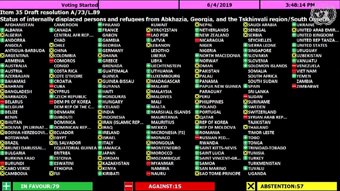
UN General Assembly adopts resolution on IDPs initiated by Georgia and 44 other member states
By Nika Gamtsemlidze
Thursday, June 6
On June 4, 2019, in New York, the General Assembly of United Nations once again adopted a resolution initiated by Georgia and 44 other UN member states on "Status of Internally Displaced Persons and Refugees from Abkhazia, Georgia and the Tskhinvali Region/South Ossetia, Georgia."
At the 88th plenary meeting, 73rd Session of the Assembly, the resolution was supported by 79 countries, while 15 were against and 57 abstained.
The UN General Assembly has been adopting the resolution since 2008, reaffirming and strengthening the fundamental rights of IDPs, first and foremost their right of voluntary, safe and dignified return to their homes.
Also by the text, the Assembly called on all participants in the Geneva discussions mandated by the 2008 ceasefire agreement to intensify efforts to establish peace, commit to enhanced confidence-building measures and to take immediate steps to ensure respect for human rights.
It is noteworthy that for the first time this year, the UN member states have been given the opportunity to become co-authors of the resolution and to engage in the overall efforts to address the issue actively. Consequently, this year's resolution does not only belong to Georgia but is a joint initiative of 45 different member states.
The resolution condemns forcefully changing the demographics in the occupied regions of Georgia, emphasizes the right of IDPs, regardless of their ethnicity, to have a chance for a safe and dignified return to their homes. The resolution underscores the urgent need for humanitarian access in the Abkhazia and Tskhinvali regions.
Other than that, the resolution has a practical significance, as it tasks the Secretary-General of the United Nations to prepare an annual report on the status of the IDPs living in Georgia, as well as on the implementation of this resolution.
While presenting the resolution, the Permanent Representative of Georgia to the United Nations, H.E. Mr. Kaha Imnadze emphasized that the text is based on the Guiding Principles of Internal Displacement. Mr. Imnadze noted that the security and human rights situation inside the occupied Georgian territories remain extremely alarming, saying "Year after year, we continue to witness the installation of razor-wire fences and the so-called "border" signs cutting through the villages and even backyards of the residents. These installations reached an appalling 49 km in Abkhazia region and more than 52 km in the Tskhinvali region/South Ossetia, as also condemned by the Secretary-General in his latest report."
He also talked about kidnappings and tragic killings, "such cases are far too often and far too many: Basharuli, Otkhozoria, Tatunashvili, Kvaratskhelia. Each year I give a name of a new victim, hoping to be the last, but the list never stops to grow," noted Imnadze.
During the session, the supporting statements were delivered by some UN member states, the representative of the Nordic and Baltic States, Audra Plepyte (Lithuania), reaffirmed strong support for the sovereignty and territorial integrity of Georgia within its internationally recognized borders. She noted that after more than a decade of the Assembly's first resolution on the matter, "no progress has been made."
Volodymyr Yelchenko (Ukraine), representing the Organization for Democracy and Economic Development-GUAM, stressed that ensuring the safe and dignified return of internally displaced persons in the area — as a principal way for achieving durable solutions — is an overarching goal.
He also noted that Secretary-General's report "observed no major changes" during the reporting period.
Stephen Hickey, the representative of United Kingdom, stressed that for more than a decade, it has been necessary to annually reaffirm the inalienable right for internally displaced persons to return home, regardless of their ethnic origin. "This is a humanitarian and human rights issue, and it should not be linked to wider political processes," noted Hickey.
On the other hand, representative of Russian Federation, Gennady V. Kuzmin called the text "highly politicized," as he said, "we should be talking about peaceful coexistence in the region, based on geopolitical realities."
According to the statement issued by the Ministry of Foreign Affairs of Georgia, adoption of the resolution by the General Assembly highlights that the situation in the country remains on the agenda of the world's most important forum.
It's been more than a decade since the Assembly has passed the first similar non-binding resolution. Last year, 81 countries voted in favour, 16 against, with 62 abstentions; while in 2017, the number of the states voting in favour was 80, against – 14, with 61 abstentions.
It should be noted that, for the first time, Armenia abstained from the vote, while in previous years, the country only went against the resolution.
This year, along with Russian Federation, following countries decided to vote against the resolution: Belarus; Burundi; Comoros; Cuba; North Korea; Laos; Myanmar; Nauru; Nicaragua; Sudan; Syria; Venezuela, Vietnam, and Zimbabwe.



